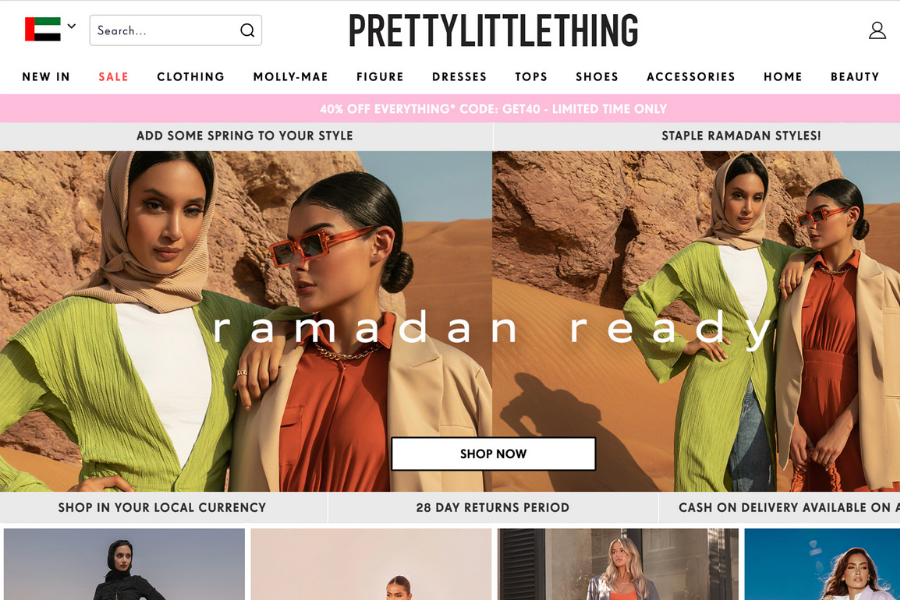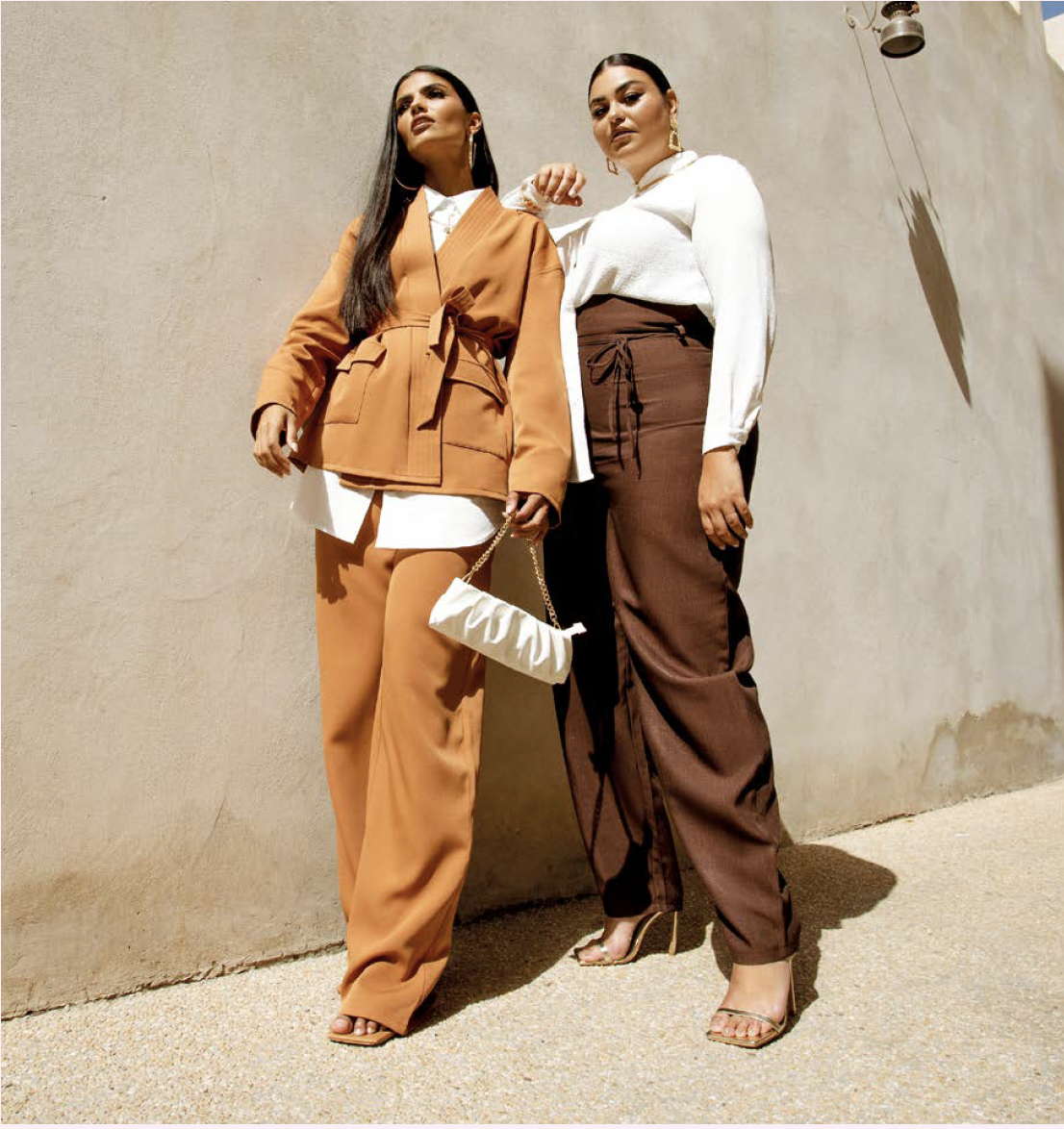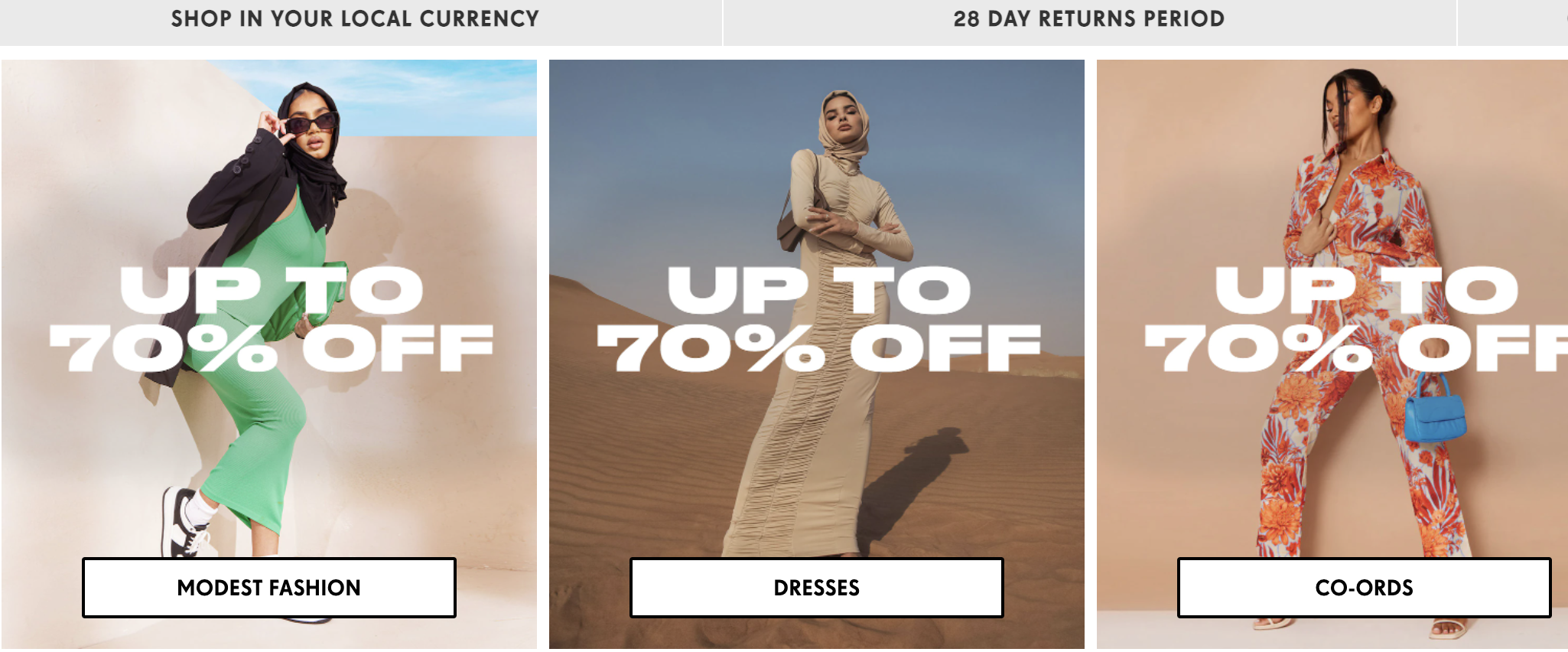
The global online fashion market is now a $500 billion industry, with fashion e-commerce making up a third of all online sales worldwide. Fashion e-commerce grew four times faster than brick-and-mortar retail between 2013 and 2017, according to a recent McKinsey report. In MENA, the figures show that the fashion e-commerce landscape is ripe with opportunity. It is the second biggest category after electronics and was worth $1.6 billion in 2018. The industry has grown 28% over the past 4 years, almost 3.5x faster than overall fashion in MENA (which has been growing at a rate of 8% annually).
“The UAE is the most advanced market for online fashion, valued at $650 million and projected to reach $1.9 billion by 2022,” said Sufeena Hussain, Head of Middle East & North Africa at PrettyLittleThing.ae

Originally launched as an accessories-only website, PrettyLittleThing is a UK-based fast fashion retailer owned by Boohoo Group and operates in the UK, Ireland, Australia, US, France, Middle East and North Africa. From the new season trends you need to know, how-tos, celeb style and everything in between, this womenswear fashion has rapidly grown into a popular e-tailer globally. “We believe style should be accessible to all, whatever your budget, as we deliver products inspired from the catwalk and the coolest muses of the moment. Our girl knows she can trust us for everything she needs from the latest trend-led pieces to celebrity-inspired looks, to the everyday wardrobe staples and that ultimate party piece. We have gone beyond offering just clothing to become an authority in fashion and beauty in our own right, providing our customer with everything a modern girl needs to own her own style,” she said.
Modern customers are now open to choice and the dynamic nature of the online fashion sector in the Middle East is continuously evolving. “Building PrettyLittleThing’s brand presence in MENA has been an exciting and rewarding journey. Women all over the world deserve a shopping destination that offers trendy, affordable fashion choices at the click of a button and being responsible for overseeing the PLT experience for women in this region has been an honour. Taking inspiration from the catwalk, celebrities and influencers, PLT is determined to not only anticipate trends but create them,” she added.

Extending the inclusive collections to women in this region has been a real joyous experience. The fashion landscape is evolving with many players in the e-commerce market. It allows consumers to quickly compare offerings and it’s oriented to set and embrace new trends, somehow defining fresh ways of being at every season. At the same time, the rise of fast fashion is competitive. “We challenge ourselves to go bigger and better after every campaign, collection and event. PLT endeavors to be a one-stop destination for every woman’s daily needs and over the years has become a lifestyle brand developing diversity in the collections and vast offerings,” she said. As today’s world is so fast-paced, convenience is a key factor for the target market. PLT recognises this and delivers it by providing accessible, affordable fashion choices with ease. It also plays a huge part in facilitating means to on-trend fashion pieces helping eliminate the growing pressures that come with the social media age we live in.
The beauty of the digital world, and being an e-commerce shopping destination is that accessibility is not halted by the restriction we experienced during the pandemic.

In fact, consumers who typically prefer in-store shopping experiences were introduced to the ease of online shopping, which has helped shift mindsets. Despite the pandemic, the fashion industry in the UAE was booming. E-commerce shopping shaped the retail landscape across the region. Post-pandemic, Dubai is seeing a daily increase in customers in this region opting to shop online. With the constantly shifting mindsets, what does the Middle Eastern consumers gravitate more towards? “With the Middle East being so diverse and a huge melting pot of different races, cultures and religions, consumer behavior varies considerably. It is so difficult to categorise the Middle East consumer into one (bracket) hence it is paramount for PLT to ensure options are as diverse as our customers. PLT has built a movement and community online we call #everyBODYinPLT, which is the basis of everything we do – we curate collections and campaigns with ‘everyBODY’ in mind”,”exclaimed Sufeena.
“As the world continues to transform digitally, e-commerce shopping is set to become even more advanced with lots of exciting new technologies and social media platforms being implemented to help make the experience as seamless and savvy as possible,” she added. The fashion industry in the UAE is dynamic and exciting. With the rise of e-commerce and digital marketing within the region, fashion brands must update their marketing strategies to align with shifting consumer demands and expectations. Shopping has evolved and marketing tactics must stay ahead of the game to stand out. Online habits tell us that consumers are hungry for choice. “With UAE and KSA being a key market for PLT, we want to really hone in on the modest collection, listening closely to what the Arab woman wants and ensuring we meet these needs season after season,” she concluded. ■
You must be logged in to post a comment.